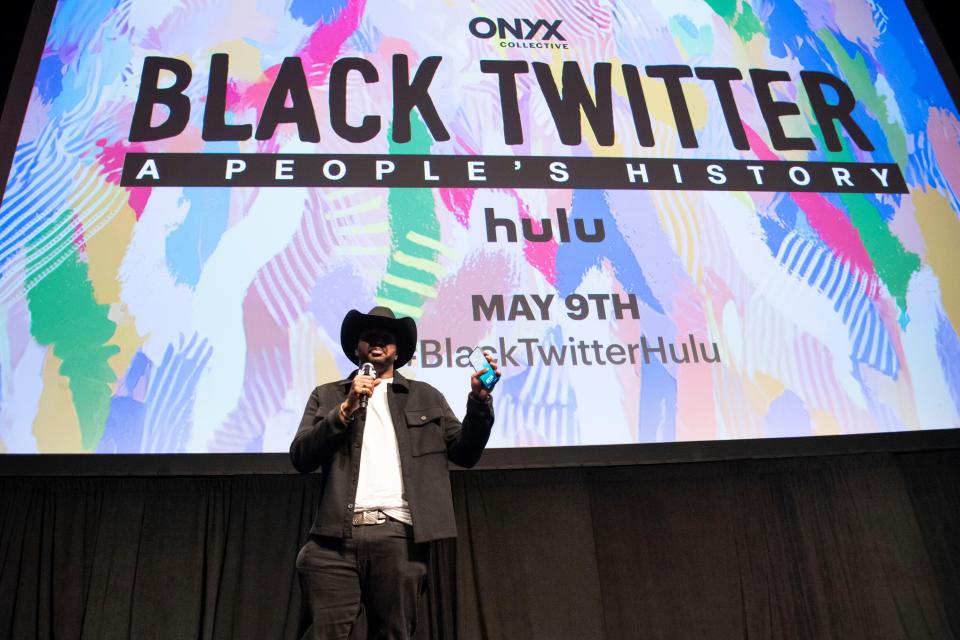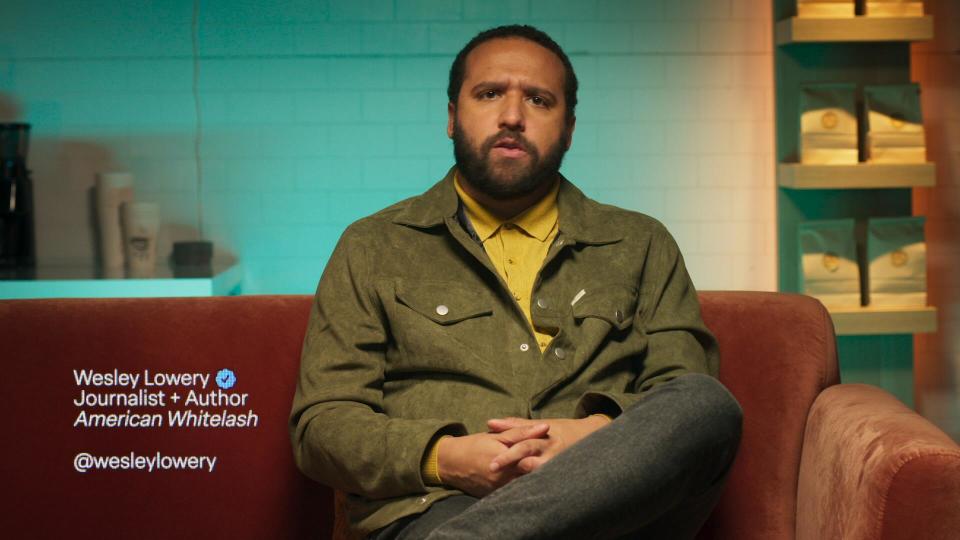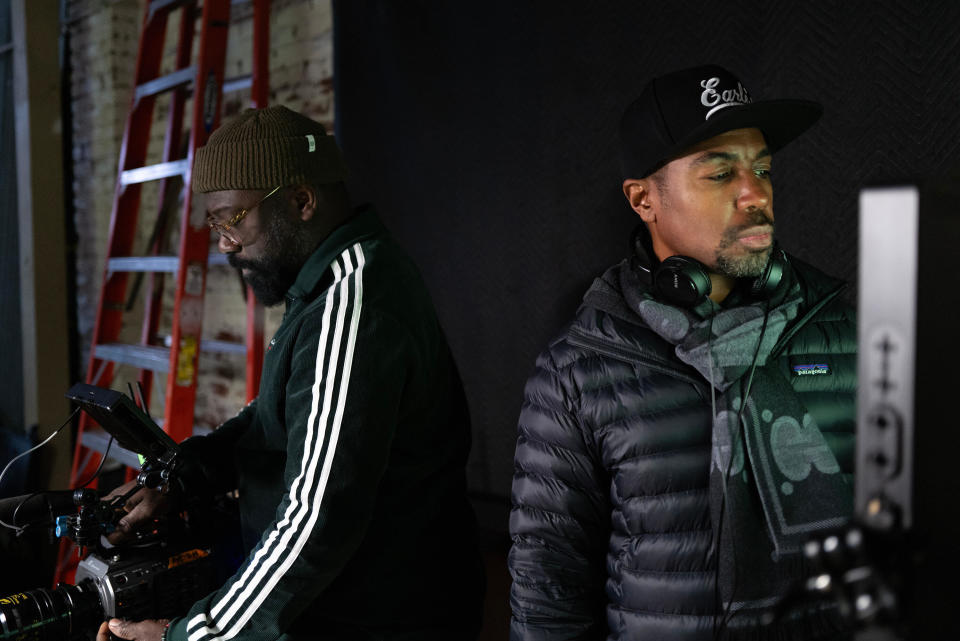Black Twitter: A People’s History Is a Necessary Archive Contextualizing the Impact of Modern Black Culture

Disney/Hulu
In this op-ed, culture writer Ellice Ellis argues that the much-criticized Hulu docuseries Black Twitter: A People's History is an essential archival body of work for Black culture that amplifies necessary voices who can contextualize and celebrate the collective power of Black people on the Internet.
One of the ever-present and foundational phrases used to discuss Black life in the 21st century is that "Blackness is not a monolith." There is no better way to continue asserting that truth than by documenting our experiences, or further, documenting the web of modern Black interconnectivity, community, and creativity that is Black Twitter.
Black Twitter: A People’s History, out today May 9 on Hulu, is directed and executive produced by Prentice Penny and Joie Jacoby and based on the WIRED article of the same name written by Jason Partham. The docuseries features insights from writers Kid Fury and Luvvie Ajayi, journalists Jemele Hill and Wesley Lowery, author Roxane Gay, activist Raquel Willis, professors Andre Brock and Dr. Meredith Clark, and many more. We also hear from former Black employees and changemakers of Twitter who held senior positions within the company, and whose experiences at Twitter up until its transformation to X help evaluate the platform's future under the leadership of Elon Musk.
When the teaser trailer for Black Twitter: A People’s History was released in early March, I scrolled through dozens of similar reactions on my timeline on X. "This feels cringe in like an exploitative way. Like I feel like white people are the target audience because literally the ones that already get it, get it," one user wrote. Another user posted, “If this is hearing from a bunch of celebrities or ‘influencers’ than [sic] it completely missed the mark... Black Twitter was built and is sustained by everyday Black folk.”
Ahead of the show’s release, more and more posts criticized the inclusion of seemingly “unknown” Black Twitter users, preemptively arguing that the series was not relatable, did not feature ordinary people, and catered to the white gaze.
These opinions aren't entirely baseless; the teaser boasts a host of blue-checked Black public figures — including many who might have carried the status before it became a paid feature — some of whom have been seen by the non-verified Black community as representing Blackness on the platform in a contrived or elitist way.
The issue here lies in the fact that these academics, distinguished writers, digital organizers, and others featured in the trailer have often become the public face of Black Twitter, which can unintentionally alienate and misrepresent long-standing users who lack such status but have significantly contributed to the platform's growth and the success of the entity that is Black Twitter. Though many of the doc’s faces might be unfamiliar to or dismissed by the average Black Twitter user, it’s important to note that they are still fundamental to the culture. The platform would not be what it is today without them.
How the first trailer presents Black Twitter also contradicts its grassroots nature — however, in episode 1, it is asserted when talking heads like Rembert Browne, who worked as director of product and community at Twitter, doubles down that Black Twitter is a space where people don't hold your hand or tell you what's happening; you must keep up.
I invite naysayers of the series and those skeptical of its authenticity and who it is for to take a step back and ask: if Twitter/X were to cease to exist tomorrow, what would become of the legacy of Black Twitter? Would it be a myth?
Our recipes being passed down orally, "the nod" between two Black people, not splitting the pole, the discerning question of "Who all gonna be there?" — Black Twitter runs in the tradition of other Black cultural phenomena that exist with no user manual. Yet, relying solely on this informal understanding risks losing a record of the things, people, and places that we, as "the culture," value.
Although screenshots and sites like Wayback Machine exist, the Internet is impermanent, and film and television, books, articles, and digital and physical archives are what cement our cultural legacy and archive our existences beyond word of mouth. Documenting Black Twitter is essential to solidifying its endurance as a pop culture sensation, political powerhouse, and staple in our technology and digital landscape.
It's not that we need professors and academics like Clarke and Brock to validate the oral and linguistic traditions within Black Twitter, but their contributions are precious in a world where texts documenting the Black experience are being banned and curriculums are being altered to sanitize Black history.

Black Twitter: A People's History
Black Twitter: A People's History aims to highlight how pivotal the platform has been in shaping some of America's significant historical moments, ensuring that we don’t “lose recipes” — or forget the lessons and impacts derived from these events.
The doc explores how Black Twitter has interacted with and influenced significant cultural moments and movements off of the platform. It narrates Barack Obama’s first election, the emergence of Donald Trump as a political figure, Michael Brown's death, the Ferguson protests, and more. It forces us to ask the question, would Trayvon Martin's killer have been arrested if it weren’t for Black Twitter tweeting about his death? Would Obama have been reelected without the muscle that is Black Twitter? Would the Oscars have made any DEI efforts without April Reign's #OscarSoWhite?
The docuseries isn't perfect and often succumbs to its skeptics, particularly those concerned with its tilt towards the white gaze. It occasionally undermines the message that Black people are not a monolith by featuring stereotypical set-ups — during a roundtable scene of influential Black Twitter users, there are chicken and waffles, mimosas, and a strategically placed plate of watermelon on the table. These details and scripted buzzwords like "clapback" detract from the film's intellectual depth.
But there are moments in the series that might inspire future generations to use social networking platforms of the present and future for digital organizing or to force major news networks and institutions to address incidents of race-based police violence, genocide, and injustice. The series used the tweets from everyday users as well as the reports from journalists like Wesley Lowery and Brandon “Jinx” Jenkins, who used the platform for on-the-ground reporting in Ferguson to spark a national conversation as an example of what can be done.

Black Twitter: A People's History
DisneySimilar to how foundational civil rights documentaries like the 14-part Eyes on the Prize or Rise Up: The Movement that Changed America have outlined the beginnings of the Montgomery Bus Boycott or the Greensboro Lunch Counter Sit-In, A People's History of Black Twitter provides us with Black Twitter's origin story, as well as the genesis of the platform itself. It gives faces to the people behind Black Twitter's biggest moments, and more importantly, contextualizes their contributions to the culture.
In the same way that we acknowledge, respect, and listen to civil rights organizers like Ella Baker, Diane Nash, and Julian Bond of the SNCC, it's crucial we hear from digital organizers who started or contributed to influential hashtags like #BlackLivesMatter, #OscarsSoWhite, #BlackGirlMagic, and even the less politically-leaning hashtags that fostered joy and community, like #UKnowUrBlackWhen or #N*****Navy.
Before watching Hulu's Black Twitter: A People's History, you must do two pre-reading acts: One, read “A People's History of Black Twitter,” written by Jason Parham for WIRED in 2021, and two, read the essay “Technology & Ethos” written by writer, poet, and political activist Amiri Baraka.
Baraka's words are a guiding thread for both Parham’s article and the docuseries, leading us to a crucial message: technologies are not neutral but imbued with cultural significance and ethical dimensions. This understanding is key to fully grasping the show’s exploration of Black Twitter's impact, especially as it touches on some of Black Twitter's lowest points, such as the rise of Kevin Samuels and the black manosphere or misogynoir and repeated harassment of queer users.
While, yes, it touches on the sh*ts and giggles of Black Twitter — think Rihanna telling Ciara, “Good luck booking that stage you speak of” — the central theme of the three-part series is that Black people have reimagined Twitter's technology to reflect our diversity, humor, trends, and ethics. In his 2021 piece, Parham writes, "For Black users today, Twitter is Baraka’s prophetic machine: voice and community, power and empowerment."

Black Twitter: A People's History
When I reckon with Baraka's words, it leads me back to why this docuseries is important. We must use technology to our own power. Being afraid of what white people or other outside cultures may manipulate or copy from our cultural traditions cannot stop us from documenting them. We must never forget that we are the key drivers of technology and cultural events. By documenting Black Twitter in this way, with experts weighing in on this doc, we are arming ourselves with the knowledge that Black people can have and will continue to organize digitally for our political freedom, technological rights, and joy.
Documentaries are not exhaustive records of a single moment, a piece of the pop culture zeitgeist, or a revolution, by any means. Better yet, they are one of many lenses through which we can examine history. Black Twitter: A People's History is undoubtedly from the lens of the older and original guard of Black Twitter; it's not necessarily a people's docuseries, as the name suggests.
I'm curious if and who would be behind the production that surveys everyday users, those without social capital, elite media jobs, or "blue checks."
This series is unlikely to unveil new anecdotes to those who have danced in Black Twitter's digital threads for a decade or more. Yet, younger members of Gen Z and Gen Alpha who aren't old enough to know where #BlackGirlMagic came from or remember how the platform was being used by its Black users during the Trayvon Martin trial may find the series’ approach to Black Internet lore alluring.
When you watch Black Twitter: A People's History, discover a new depth of our community power and think about how we can inspire the next generation to utilize that power online and in real life. After all, Black Twitter has never been about teaching Black history. It’s about living it.
Originally Appeared on Teen Vogue
Want more great Culture stories from Teen Vogue? Check these out:
A New Generation of Pretty Little Liars Takes on the Horrors of Being a Teenage Girl
Underneath Chappell Roan’s Hannah Montana Wig? A Pop Star for the Ages
Donald Glover’s Swarm Is Another Piece of Fandom Media That Dehumanizes Black Women
On Velma, Mindy Kaling, and Whether Brown Girls Can Ever Like Ourselves on TV
Gaten Matarazzo Talks Spoilers, Dustin Henderson, and Growing Up on Stranger Things
How K-pop Stars Are Leading Mental Health Conversations for AAPI People and Beyond
Meet the Collective of Philly TikTokers Making You Shake Your Hips
The Midnight Club Star Ruth Codd Isn’t Defined By Her Disability


